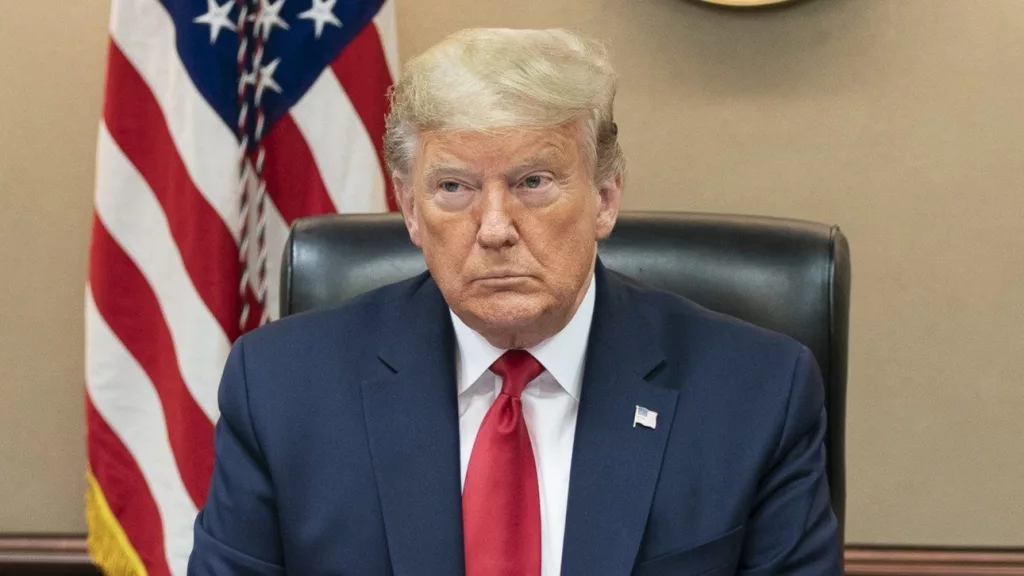WASHINGTON, D.C. – Washington Sen. Maria Cantwell has emerged as a leading voice in Congress opposing President Donald Trump’s universal tariffs announced last week.
Her new bipartisan legislation to give Congress more authority over trade policy has more than half a dozen Republican cosponsors in the U.S. Senate.
And on Tuesday, Cantwell was one of many senators who grilled the president’s top trade advisor after days of stock market turmoil, anxiety over the price of goods, and growing concerns about the country plunging into a recession.
“I represent a trade economy,” Cantwell told U.S. Trade Representative Jamieson Greer. “I represent the success of what innovation and trade gets you.
“You’re coming here telling me that tariff is the tool,” added the Democratic senator from Edmonds. “And I’m telling you innovation is the tool.”
Trump’s broad new tariffs, including 10% import taxes across the board and much higher rates on many other countries, are set to go into effect Wednesday. Some countries, including China, retaliated, or threatened to retaliate, with tariffs of their own. The president hopes the levies will boost domestic industrial production after decades of outsourcing.
After a strong start Tuesday, the S&P 500 was down over 1.5% at market close, despite signs the Trump administration could be open to negotiations on tariffs. The index has dropped nearly 11% in the past five days.
Back in this Washington, Republicans in Olympia said the tariffs, widely believed to drive up prices for consumers, are a matter of “some short-term pain for long-term gain.”
“I don’t claim to be an economic genius in any way, shape or form, but I’m going to wait and see,” state Sen. Keith Wagoner, R-Sedro-Woolley, told reporters Tuesday. “And hopefully it will land on the right place.”
But industry leaders here are worried tariffs will deal a debilitating blow to the state economy.
And last week, Gov. Bob Ferguson called the tariffs “a direct threat to affordability and prosperity for families, communities, and businesses across Washington state.”
“It’s time for the president to step back from the brink of economic turmoil, and for the Congress to reassert its authority over trade policy,” he said.
The legislation
Cantwell’s bill seeks to add guardrails on the president’s trade power.
“As representatives of the American people, Congress has a duty to stop actions that will cause them harm,” she said in a statement.
The legislation, spearheaded along with Republican Sen. Chuck Grassley from Iowa, requires the president to notify Congress of the imposition or increase in a tariff within 48 hours. The notice must explain the rationale behind the levy and analyze how it could impact the country’s businesses and consumers.
Within 60 days, Congress would have to pass a joint resolution approving the new tariff, or it would expire. And Congress could end tariffs at any time via resolution.
Article 1 of the U.S. Constitution says Congress “shall have Power To lay and collect Taxes, Duties, Imposts and Excises” and “to regulate Commerce with foreign Nations.”
The bill, called the Trade Review Act of 2025, is modeled after the War Powers Resolution of 1973, a bipartisan law that aimed to stop presidents from going to war without congressional consent. Congress had to override then-President Richard Nixon’s veto to pass the law near the end of the Vietnam War.
On Tuesday, Cantwell castigated Greer for the Trump administration not preparing Congress for the emergency tariffs.
She said Trump “could have opened these conversations with these countries without the tariffs, and saved a lot of people a lot of pain and anguish.”
The bill has garnered some bipartisan support in the Senate and endorsements from retail and business trade groups.
An identical bill in the House has also earned some Republican backing, including central Washington Rep. Dan Newhouse, his spokesperson confirmed Tuesday.
But the proposal has little chance of being enshrined in law, as Speaker of the House Mike Johnson has said Congress would be hands-off as Trump implements widespread tariffs. Senate Majority Leader John Thune, of South Dakota, has said the idea doesn’t have a chance.
And the White House has said Trump would veto the bill if it reached his desk.
The fallout for Washington state
With about $60 billion in annual international exports, Washington is one of the most trade-dependent states in the nation. Two out of every five jobs in the state are linked to international trade, officials say.
“Washington state stands to lose among the most from Trump’s destructive trade war,” Sen. Patty Murray said on a press call.
For example, Trump imposed a 24% tariff on goods from Japan, potentially straining the relationship with Washington’s biggest destination for exported processed potatoes.
The state is a top producer of apples, blueberries, hops, pears, spearmint oil and cherries, exports of which could also be targeted for retaliatory tariffs, said Lori Otto Punke, the president of the Washington Council on International Trade.
Washington’s farmers have been here before. A tariff tug-of-war started during the first Trump administration forced Washington’s apple exports to India to plummet. Cherry exports to China also dropped precipitously due to tariffs.
A rising concern is budding anti-American sentiment among what used to be trade allies, like Canada, the top importer of Washington agricultural products, said Rianne Ham, of the state Department of Agriculture. Trust will be broken in trade relationships that took years to foster, she added.
State Commerce Director Joe Nguyen told reporters that tariffs on key trade partners like India, Vietnam, Taiwan and South Korea will “ripple throughout our economy.”
The tariffs on imports from Vietnam and Indonesia — 46% and 32%, respectively — will hurt coffee roasters and cafes, said Blas Alfaro, senior vice president at Fulcrum Coffee Roasters in Seattle.
“Those tariffs don’t just affect imports, they affect real people, local businesses and the community economy,” Alfaro said.
And while the goal of the tariffs is boosting domestic manufacturing, the tariffs will drive up the cost of materials used in manufacturing, Otto Punke noted.
The tariffs “disrupt industries like Boeing, our shipping terminals, our farmers, our tech companies,” Nguyen said. “All of this is on the line.”
This story first appeared on Washington State Standard.





